A plastic world
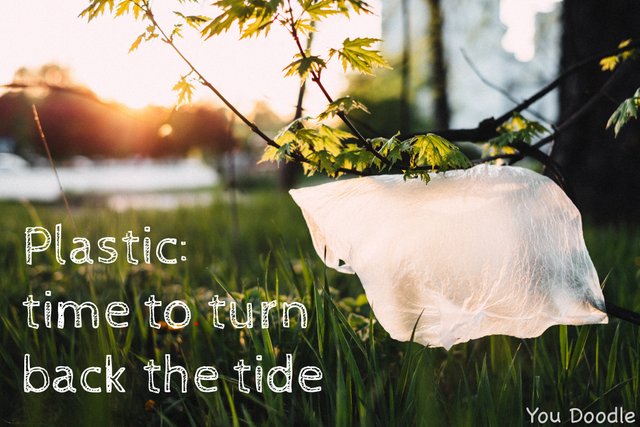
The news of a new island appearing in a tropical sea sounds oh so romantic. But when it's an island of trash, it's about as unromantic as it gets. Sadly, these "plastic islands" regularly hit the headlines these days. One five-mile island of waste that was spotted off the Caribbean last year was filmed by underwater photographer Caroline Power.
It's not surprsing that many people feel inclined to switch off at the very mention of plastic pollution. Plastic permeates our 21st century society. Despite plastic bag charges, fresh plastic arrives in every single supermarket haul. It comes through the post, and it's in all the technology we use. Rarely a day goes by for a man, woman or child in the "developed" countries without a new piece of plastic being used and then discarded.
No wonder most of us feel so overwhelmed at the thought of this that we just want to turn off and let someone else deal with it.
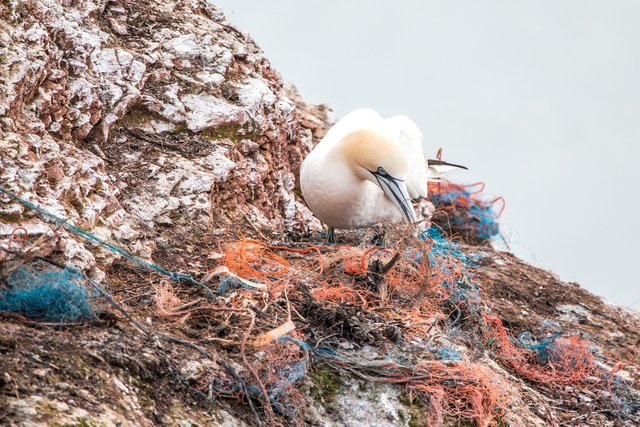
Source
In fact, I think that even as individuals in a big world, we do have power to change this situation. And it's not as difficult or as overwhelming as we think, because if enough people take just small steps, that can make an enormous difference.
Beautiful remote beach is no longer "unspoiled"
One of my favourite YouTubers is Ben Dolphin. His channel is called Benvironment, because the environment is one of his main concerns. Ben, like myself, is a passionate hillwalker and mountaineer, and he is also a gifted amateur wildlife photographer.
A couple of years ago he did a vlog about a visit to Sandwood Bay, one of Scotland's most remote and unspoiled beaches, only accessible via a four-mile hike. Sadly, Ben found quite a lot of plastic trash on the beach, and it probably hadn't been dropped by visitors, but simply washed up from the ocean.
In the video, Ben gets visibly distressed, and even suggests that humanity might want to just "write it all off as a bad idea". Ben's video can be seen here:
I can see why he got so dejected, but I actually think that the ball has started rolling, and as long as enough of us are prepared to run with it, this problem can be slowed down, and eventually turned back.
But it's an urgent one, and we have to start acting, like yesterday!
A very modern problem
Plastics have only been in mass production since the 1950s. Researchers last year estimated that 8,300 million metric tons of new plastics had been produced since 1950.
· More than three-quarters of the total plastic produced up to 2015 –approximately 6300 metric tons – had been turned into waste.
· Just 9% of this was recycled, 12% was incinerated, and 79% ended up in landfills or polluting the natural environment.
This is despite the fact that the "Great Pacific Garbage Patch", a vast ocean current system of floating plastic debris, trash and pollution, has been known about since the late 1980s.Most shockingly, around half of all the plastic in existence was produced in the 13 years to 2015.
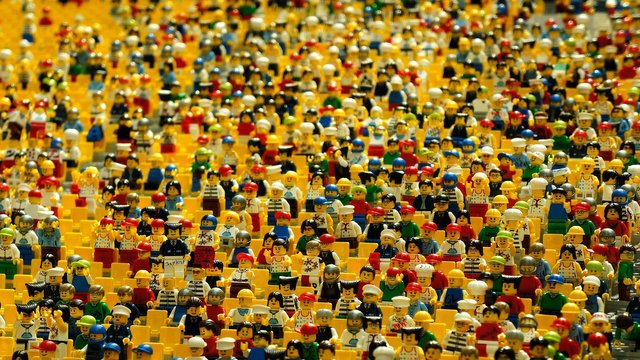
We are a plastic population. Source
It does make me marvel at how quick my own species is to devour a new trend or anything that makes our lives more convenient – yet in comparison, how slow we are to recognise and get round to dealing with a burgeoning environmental disaster that could drastically affect the health and well-being of everyone on the planet.
We are all eating plastic! Plastic is flowing through the food chain.
On the bright side...
I've been worrying about this problem on and off for years, going through the whole "I must do something about this... I'll use glass bottles instead of plastic... but that won't really change anything... oh, it's just too overwhelming! Let's just forget about it" cycle.
When the plastic bag charge was introduced in the UK a few years ago, I cynically thought it was the typical government response to an environmental problem: try to make some money out of it while you tinker around the edges.
However, I think we are starting to see some fundamental changes in attitude, and when enough people start demanding change, the market starts to listen!
The BBC documentary Blue Planet II highlighted the problem of oceanic plastic waste, showing the harm it can cause sea creatures. I don't have a TV, but I remember people talking about how upsetting it was.
Campaigns against plastic straws and plastic stems on cotton buds have led some manufacturers and retailers to introduce plastic-free lines.
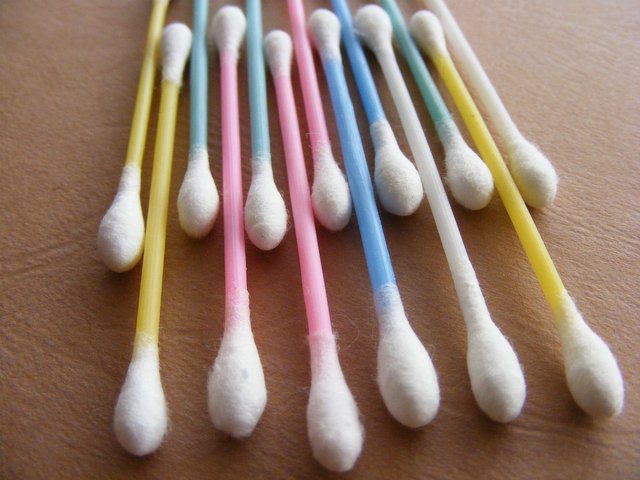
These cotton buds will only be used once, but will take hundreds of years to degrade. And they could easily be made from cardboard. Photo: byrev
· A UN resolution to stop plastic waste entering our oceans was signed by 193 countries. However this initiative is not legally binding, and there is no timetable. Hmm... maybe not so positive.
· Plastic microbeads have been banned in the UK - it's almost hard to believe that these are ingredients in some beauty and personal care products.
· The plastics industry is behaving as if it's under siege. This industry lobbies the government quite heavily, but even within the industry, awareness of the problem of plastic pollution and the importance of recycling is leading the debate.
· Dutch inventor Boyan Slat has devised a method of cleaning up oceanic plastic waste, which he believes can clean up 50% of the waste within five years. Of course this will not get rid of the problem completely, as plastic can take up to a thousand years to degrade. Plastic bottles can take 450 years to degrade in landfill, while it can take plastic nappies (diapers) 200-250 years.
Recycling is very important, but it's more of a sticking plaster than a cure for the problem of plastic pollution. The real answer to this problem starts with us. If we demand alternative materials strongly enough, the market will try to produce them.
And that's what I see starting to happen. I'm seeing more non-plastic alternatives for household goods. Things like wooden toothbrushes with bamboo bristles are becoming much easier to find online. Non plastic goods are becoming trendy, reviewed in glossy Sunday supplements, rather than hard to find curiosities of the environmental fringe.
I would like to treat this issue in a positive way. I'm not out to shame anyone, or to make anyone feel guilty. Let's face it: we all, every single one of us, use plastic. This is not about me saying, "Hey – I'm a very pure plastic-free person!" It's about taking baby steps which will hopefully become a critical mass, towards a plastic-free society, where people will find it easy to live without plastic because the shops are all full of plastic-free goods.
I'm going to start doing reviews of plastic-free goods I've bought recently – items that that would normally be made using a lot of plastic, but which are now available plastic-free.
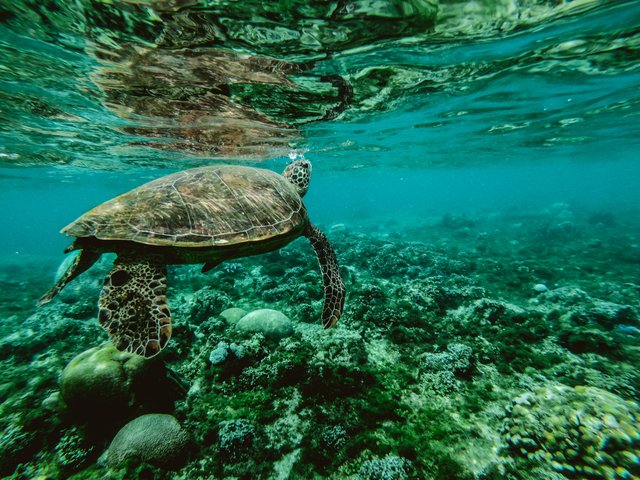
This is how it should be. Photo by Belle Co.
Let's start turning back the tide of plastic!
Posted from my blog with SteemPress : http://ramblingandscrambling.co.uk/wastematters/a-plastic-world/
.gif)
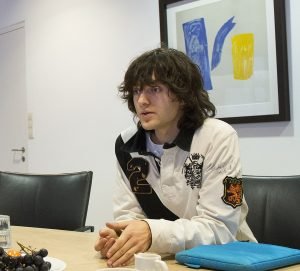
Congratulations! This post has been chosen as one of the daily Whistle Stops for The STEEM Engine!
You can see your post's place along the track here: The Daily Whistle Stops, Issue 244 (9/01/18)
It is just sad that also marine creatures die from ocean rubbish and I wouldn't even look at rock salt as like before. @natubat
It's a tragedy for marine life. And for humans too in the long term.
I am also write few post about the harmful aspects of plastic. And you are also write a good article. Thanks.
Thanks @hafizullah! It is such an important topic.
Great post!
My family is trying to use less plastic here, and looking for healthier and more environmentally safe alternatives.
Thanks! I really think there are more alternatives to plastic coming onto the market. I'm going to post about a few that I've found soon :)
Great! Looking forward to it!
The plastic island was the reason why I left greenpeace. I used to volunteer for them about 4 years ago when this issue popped out and we had a meeting to discuss whether or not open a campaign about this, but it was against they're policy to organize active actions, so... I don't know it the idea that even a big association with quite a lot of money can't do anything to fix this huge problem we created made me feel very bad.
It makes me still feel very bad :/
At the moment I'm living almost plastic free even if I can't always avoid it. It doesn't fix the problem, but it helps not to make the island grow bigger and bigger at least
Respect to you for living almost plastic free and setting an example - very difficult in this day and age. We often give up on things like this, because we think that we can't make a difference, but we're all part of the market, and if enough people start to demand plastic-free goods, the market will provide.
Yes, if everyone would react we could easily reach a critical mass and change the situation.
I also understand that for someone it's easier and for other this would require a lot more effort, because in some enviroments is very hard to avoid certain habits and even to become conscious of the fact the they are dangerous, BUT this is a serious issue and we must do something to fix this.
Very nice.
Please!!!!! upvote me.
Congratulations @natubat! You have completed the following achievement on Steemit and have been rewarded with new badge(s) :
Click on the badge to view your Board of Honor.
If you no longer want to receive notifications, reply to this comment with the word
STOP